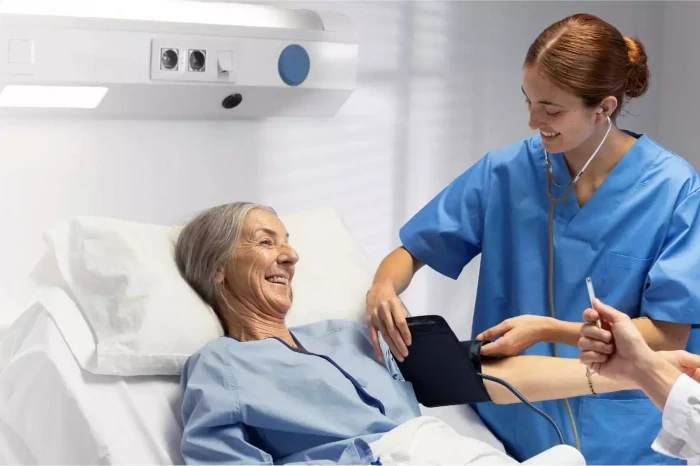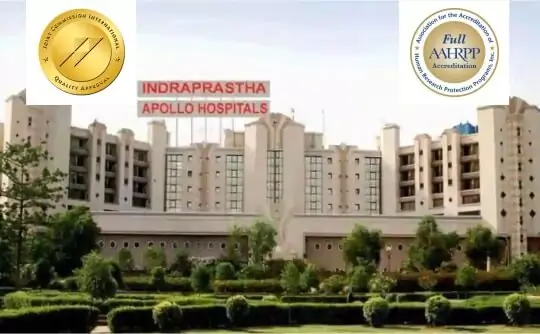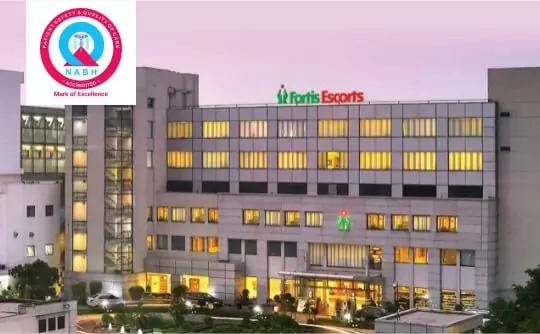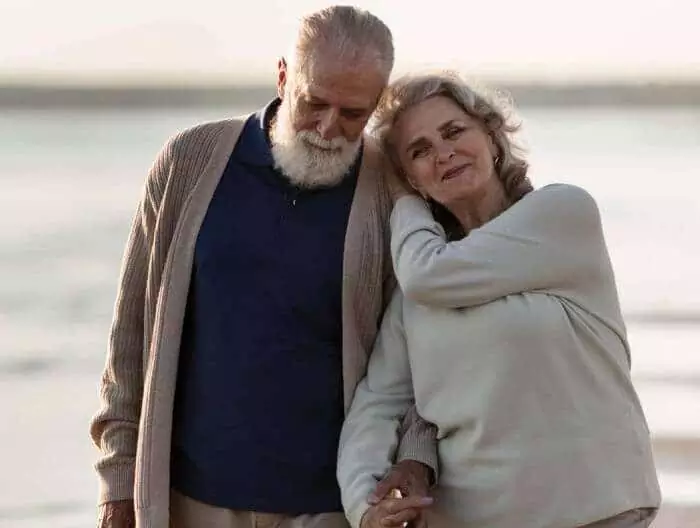

TAVI (Transaortic Valve Implantation ) Procedure Cost in India starts from US $42,000 and varies depending on your medical history and condition, surgeon, hospital and the city where you choose to get the surgery done.
An important expense when it comes to your TAVI Procedure is going to be your heart surgeon's fees. IndiCure recommends only experienced, skilled, board-certified surgeons who are capable of delivering successful heart surgeries. Although the charges may vary depending on the experience of the surgeon, you can be completely assured of being in safe and experienced hands when you choose heart surgery in India with IndiCure.
With the hopes of improving patient care, new techniques and technologies are often introduced to the surgical process. Such innovative advancements in the surgical approach can increase costs.
Having your TAVI Procedure in an accredited surgical facility by skilled and qualified medical staff is a critical factor. Moreover, the geographical location of this facility also affects the initial quote. But, IndiCure provides you with a projected estimate that will be affordable.
The surgery-related expenses include the pre- and post-surgical expenses. The pre-surgical expenses are associated with the age and medical condition of the patient and thus the number and type of investigations required. Post-surgical expenses may include prescription medications and follow-up consultations.
We at IndiCure, understand that you travel with a budget in mind and do not like to be greeted by surprises after arrival in India. We thus club all these expenses and give you the package cost that is inclusive and affordable at the same time.
Your case manager shall give you an estimated cost of your surgery after discussing your medical reports with the surgeon. The final cost, however, shall be confirmed after your consultation with the surgeon.
In fact, we have Special Negotiated Rates with the Hospitals and you can avail Discounted Rates when you choose to Travel with IndiCure.


We Help you Choose the Right Treatment, Surgeon & Hospital

We Arrange Video/Telephonic Consultation with the Surgeon

We Assist you with Visa & Accommodation

We Receive you at the Airport and Drop you at Hotel/Hospital

We Assist you the at Hospital & Provide Post Operative Support
Years of Experience
Happy Clients
Countries Patient Treated
Most Affordable Price

New Delhi
Indraprastha Apollo Hospitals, New Delhi is a state of the art multi speciality tertiary-care hospital situated in the most posh area of South Delhi. Considered to be the flagship hospital of Apollo group, Indraprastha Apollo Hospital is one of the important landmarks not only in Delhi, but in the world map because of its popularity among the medical tourists. The hospital has been one of the most sought after medical institutions for patients from Asia Pacific and beyond.

New Delhi
Fortis Escorts Heart Institute and Research Centre is one of the most revered medical institutions not only in India, but the entire world. The institute has set benchmarks in cardiac care with path-breaking work over the last 25 plus years. The hospital has the most advanced technology and has seen the best outcomes even in the most complex cardiac cases; be it cardiac surgery, Interventional Cardiology, Pediatric Cardiology, Pediatric Cardiac Surgery or Non-invasive Cardiology
Transcatheter aortic valve implantation (TAVI) or Transcatheter aortic valve Replacement (TAVR) is a minimally invasive heart procedure to replace a narrowed aortic valve that fails to open properly (aortic valve stenosis). The procedure replaces/implants the aortic valve with a catheter.
Between the left lower heart chamber (left ventricle) and the body's main artery is the aortic valve (aorta). Blood flow from the heart to the body is reduced if the valve does not open properly. TAVI can help persons with severe aortic valve stenosis alleviate their symptoms and enhance their chances of survival.
The TAVI procedure is performed using one of two approaches, allowing the cardiologist or surgeon to choose which one provides the best and safest way to access the valve:
TAVI may be an option for people who are at intermediate or high risk of complications from surgical aortic valve replacement (open-heart surgery). The decision to treat aortic stenosis with TAVI is made after you consult with a team of heart and heart surgery specialists, who work together to determine the best treatment option for you. TAVR patients often spend less time in the hospital than those who get surgical aortic valve replacement.
If you have any of the following conditions, your doctor may consider TAVR:
The patient receives sedation or general anesthesia during the TAVI procedure. The surgeon may access your heart through a blood vessel in your leg or through a tiny incision in your chest.
A hollow tube (catheter) is inserted through the access point. The surgeon uses advanced imaging techniques to guide the catheter through your blood vessels, to your heart and into your aortic valve.
Once the new valve is positioned, a balloon on the catheter's tip is inflated to expand the replacement valve into the appropriate position. When the surgeon is certain the valve is securely in place, the catheter is removed.
You will spend one or two days in the Intensive Care Unit (ICU) after TAVI and around 4-5 days in the hospital room before you are discharged from the hospital. Your doctor may prescribe blood thinners and antibiotics to you, which should be taken without fail.
Cardiac Rehabilitation may be scheduled while you are in the hospital. Many people begin feeling better immediately after their procedure, however it may take weeks before feeling fully recovered.
TAVI (transcatheter aortic valve implantation) may enhance your overall health and quality of life by relieving the signs and symptoms of aortic valve stenosis. TAVI can also help people live longer.
It is critical to maintain a heart-healthy lifestyle as you recover and to help prevent further heart problems.
Following TAVR:
We at IndiCure completely understand your concerns and it is always our endeavor to provide the best outcome for every patient. Following is the list of questions you must ask before you embark on your journey for TAVI Procedure in India.
Prepare to answer questions about your:

Transcatheter aortic valve implantation (TAVI) is an abbreviation for transcatheter aortic valve implantation, while TAVR is an abbreviation for transcatheter aortic valve replacement. The process and tactics are identical. When discussing your treatment options, your doctor may use the terms interchangeably.
The tissue valves used in surgical aortic valve replacement have a lifespan of 10 to 20 years, according to medical literature.
Any cardiac procedure has risks involved and sometimes are life threatening risks as well. Survival rate is thus a critical measure. At our panel of best cardiac hospitals in India TAVR survival rate is more than 98%.
The TAVR operation takes three to four hours to complete. It takes roughly 30 to 45 minutes to implant a heart valve. The remaining time is spent inserting lines, ensuring you're asleep, checking your breathing, and removing lines once the process is over.
Medical literature shows that on an average, a 42-year-old patient who has an aortic valve replacement (AVR) with a tissue valve can anticipate to live till he is 58 years.
Patients who cannot tolerate medications that thin the blood or prevent blood clots, or have an active infection in the heart or elsewhere are not candidates for TAVR surgery.
You may expect to spend around 5-6 days in the hospital, with at least 1 to 2 days in the Intensive Care Unit (ICU). Depending on how healthy you were before the operation, recovery from valve surgery can take some time.
No, the heart is not stopped during TAVR surgery. During the surgery, your heart will continue to beat. This is not the same as open heart surgery, which involves your heart being stopped and you being hooked up to a heart and lung blood machine.
The average cost of TAVR in the USA ranges from $80,000 to $120,000, TAVR surgery cost in India is around $42,000.
Enhance your medical journey to India by availing these extra services.
Traveling abroad for medical reasons may be challenging. With our experience of over a decade and working with the best surgeons and top hospitals in India, we help make your medical tour easier and safer for you. We will guide you at every step of the way and make end-to-end arrangements for your surgery, travel, and stay.
Ramandeep Dhaliwal
I had great experience having rhinoplasty through Indicure. Dr. Ruchika from Indicure has helped me in finding best plastic surgeon, answering all my questions...
Read More
Joshua Archer
My name is Joshua Archer I'm from New Zealand, bay of plenty, kawerau I opted for the bypass surgery in January 2023 but planned it in advance for 28 September found IndiCure...
Read More
Kera Ren
Absolutely loved my experience with IndiCure - from first inquiring to meeting the surgeon pre op to my follow up post op. The surgeon was extremely approachable...
Read More
Andreana Paul
Had a wonderful experience. Visited India for my plastic surgery. From sending mails, airport pickup, comfortable accommodation and, to smooth hospital appointment booking...
Read More
Brandi Luce
I had the privilege of using Indicure's services for a cosmetic procedure that I had wanted for a long time but had always been apprehensive about. Ruchika helped me...
Read More
Jade M
Indicure Health Tours went above and beyond my expectations. They helped me with every aspect of my journey and were professional, kind and caring. I was...
Read More
The content on the website (www.indicure.com) is intended to be general information and is provided only as a service. It is not medical advice and should not be taken as medical advice. It should not be used to diagnose or treat a health condition and is in no way meant to be a substitute for professional medical care.
All photographs on our website of before and after results are examples only, and do not constitute an implied or any other kind of certainty for the result of surgery. You are advised to see a surgeon in person to assess what surgery may or may not accomplish for you.
It is also important to keep your expectations realistic and to understand that all surgical procedures carry risks and should never be taken lightly.